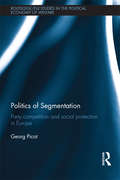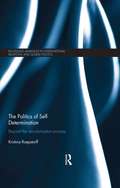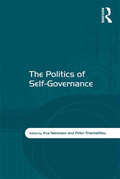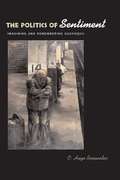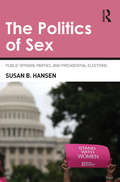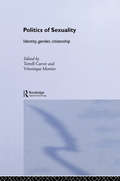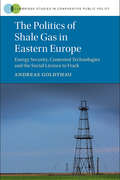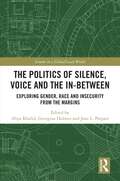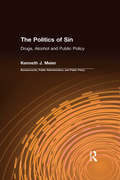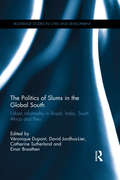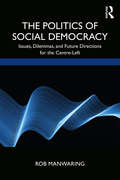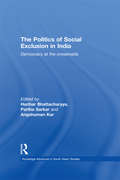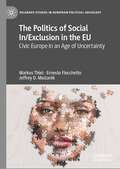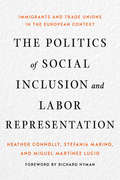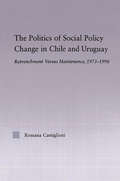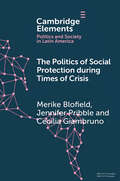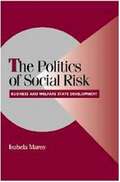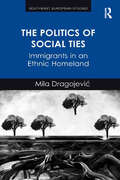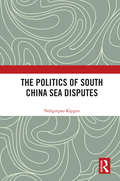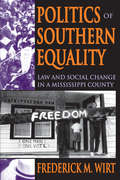- Table View
- List View
The Politics of Security Sector Reform: Challenges and Opportunities for the European Union's Global Role
by Magnus EkengrenSecurity Sector Reform (SSR) is increasingly becoming a cornerstone in international security and development cooperation. Indeed, the concept has often been seen as a panacea for many of the biggest threats to the world such as failed states, terrorism and poverty. In particular, this book focuses on the complexities of implementation of SSR across the globe and the actual and potential role for the European Union (EU) to play in SSR. As suggested in the title of the book, this involves not only opportunities, but challenges to be overcome as well. There are three core themes to this book: Policy, Policies and Practice. By presenting the themes in this particular order a greater appreciation of the influences on the process of SSR, from conception to implementation is relayed to the reader. This volume appeals to audiences interested in the EU as a global actor and the interrelationships between foreign, security, defence and development policies.
Politics of Segmentation: Party Competition and Social Protection in Europe (Routledge Studies in the Political Economy of the Welfare State)
by Georg PicotWhen political parties make policy decisions they are influenced by the competition they face from other parties. This book examines how party competition and party systems affect reforms of social protection. Featuring a historical comparison of Italy and Germany post-1945, the book shows how a high number of parties and ideological polarisation lead to fragmented and unequal social benefits. Utilising a comparative approach, the author brings together two important issues in welfare state research that have been insufficiently investigated. Firstly, the complex influence of party competition on social policy-making, and second, how some social groups enjoy better social protection than others. Moving beyond the two countries of the case study, the book proposes an innovative framework for studying segmentation of social protection and applies this framework to a wider set of 15 advanced welfare states. Overall, this book draws together different strands of research on political parties and on welfare states, and introduces a new argument on how party politics shapes social policy. An invaluable text on the political economy of the welfare state, Politics of Segmentation will be of interest to scholars of political economy, social policy and comparative politics.
The Politics of Self-Determination: Beyond the Decolonisation Process (Routledge Advances in International Relations and Global Politics)
by Kristina RoepstorffSince the formation of the UN in 1945 the international community has witnessed a number of violent self-determination conflicts such as the disintegration of Yugoslavia, Chechnya, Kashmir, and South Sudan that have been a major cause of humanitarian crises and destruction. This book examines the scope and applicability of political self-determination beyond the decolonisation process. Explaining the historical evolution of self-determination, this book provides a theoretical examination of the concept and background. Taking an interdisciplinary approach, the author analyses self-determination in relation to contemporary conflicts, which inform and drive a coherent theoretical framework for international responses to claims for self-determination. Built upon an examination of the conceptual foundations of self-determination, this book presents a new understanding and application of self-determination. It addresses the important question of whether self-determination claims legitimate armed violence, either by the self-determining group’s right to rebel, or by the international community in the form of humanitarian intervention. The Politics of Self-Determination will be of interest to students and scholars of political science, international relations, security studies and conflict studies.
The Politics of Self-Expression: The Urdu Middleclass Milieu in Mid-Twentieth Century India and Pakistan (Royal Asiatic Society Books)
by Markus DaechselThe 1930s to 1950s witnessed the rise and dominance of a political culture across much of North India which combined unprecedented levels of mobilization and organization with an effective de-politicization of politics. On the one hand obsessed with world events, people also came to understand politics as a question of personal morality and achievement. In other words, politics was about expressing the self in new ways and about finding and securing an imaginary home in a fast-moving and often terrifying universe. The scope and arguments of this book make an innovative contribution to the historiography of modern South Asia, by focusing on the middle-class milieu which was the epicentre of this new political culture.
The Politics of Self-Governance
by Peter Triantafillou Eva SørensenLiberal democracies are experiencing a major transformation of public governance by which self-regulation, co-operation and negotiation between public and private actors and across different political-administrative levels play an increasingly important role for policy-making and implementation. Using the term 'governance imagery', or what a given society envisions to be the proper way of governing public affairs, this volume examines the emergence, causes and consequences of the politics of self-governance both within relevant social science theorizing and in the everyday production of public governance in various policy areas. It questions how self-governance materialized in various areas of public governance in different liberal democracies, and the driving forces and political effects of attempts to enhance the role of self-governance. Challenging the theory and practice of public administration, The Politics of Self-Governance is an indispensable read for all those interested in new forms of public governance.
The Politics of Sentiment: Imagining and Remembering Guayaquil
by O. Hugo BenavidesBetween 1890 and 1930, the port city of Guayaquil, Ecuador, experienced a liberal revolution and a worker's movement--key elements in shaping the Ecuadorian national identity.<P> In this book, O. Hugo Benavides examines these and other pivotal features in shaping Guayaquilean identity and immigrant identity formation in general in transnational communities such as those found in New York City. <P> Turn-of-the-century Ecuador witnessed an intriguing combination of transformations: the formation of a national citizenship; extension of the popular vote to members of a traditional underclass of Indians and those of African descent; provisions for union organizing while entering into world market capitalist relations; and a separation of church and state that led to the legalization of secular divorces. Assessing how these phenomena created a unique cultural history for Guayaquileans, Benavides reveals not only a specific cultural history but also a process of developing ethnic attachment in general. He also incorporates a study of works by Medardo Angel Silva, the Afro-Ecuadorian poet whose singular literature embodies the effects of Modernism's arrival in a locale steeped in contradictions of race, class, and sexuality.
The Politics of Sex: Public Opinion, Parties, and Presidential Elections
by Susan B. HansenThe American cultural landscape has shifted considerably since the 1990s. As church attendance has declined, seculars have increased in number and in political involvement. The economy was supposed to be the most important issue in the 2008 and 2012 elections, but social issues such as gay rights and the status of women actually had a greater impact on vote choice. Moral issues and perceptions of candidate morality had less effect on voters in 2004 than in 2008. These arguments directly challenge the conventional wisdom concerning the 2004 and 2008 elections, which were supposedly decided on the basis of moral values and the economy respectively. Yet in The Politics of Sex, Susan B. Hansen justifies these claims theoretically based on evidence about how voters actually evaluate candidates. Hansen explores trends in public opinion on abortion, gay rights, and the status of women and finds that "values voters" are still crucial in presidential elections, even those supposedly fought over economic or foreign-policy issues. She then analyzes campaign strategies and vote choice to show how Barack Obama made effective use of the liberal trends in public opinion on social issues in 2008 and 2012. Hansen also examines trends in demographics, religious involvement, the institutional setting, and public opinion to predict who in future years benefit from the politics of sex. By providing an historical perspective on the changing impact of morality politics on presidential elections, this book will show how and why the politics of sex now favors the Democratic Party.
Politics of Sexuality: Identity, Gender, Citizenship (Routledge/ECPR Studies in European Political Science)
by Terrell Carver Véronique MottierThis book recognises sexuality as a mainstream concept in political analysis and explores issues in the politics of sexuality that are highly salient and controversial today. These include conceptions of citizenship and nationality linked to gender and sexuality, the legislation about the age of consent, prostitution and 'trafficing in women', the international politics of population control, abortion, sexual harrassment, and sexuality in the military. The international team of contributors provide a wide range of perspectives in a variety of contexts. On a national level they offer illustrative case studies from the UK, Ireland, the Netherlands, Spain and Israel among others, and on an international plane they cover the European Union, the UN Conference on Population and Development and the role of the Vatican as international arbiter. Moreover, the volume addresses the interaction between political discourse and the work of major theorists such as Weber, Freud, Foucault, Irigaray and Butler.
The Politics of Shale Gas in Eastern Europe: Energy Security, Contested Technologies and the Social License to Frack (Cambridge Studies in Comparative Public Policy)
by Andreas GoldthauFracking is a novel but contested energy technology – so what makes some countries embrace it while others reject it? This book argues that the reason for policy divergence lies in procedures and processes, stakeholder inclusion and whether a strong narrative underpins governmental policies. Based on a large set of primary data gathered in Poland, Bulgaria and Romania, it explores shale gas policies in Central Eastern Europe (a region strongly dependent on Russian gas imports) to unveil the importance of policy regimes for creating a ‘social licence’ for fracking. Its findings suggest that technology transfer does not happen in a vacuum, but is subject to close mutual interaction with political, economic and social forces; and that national energy policy is a matter not of ‘objective’ policy imperatives, such as Russian import dependence, but of complex domestic dynamics pertaining to institutional procedures and processes, and winners and losers.
The Politics of Shari’a Law
by Michael BuehlerThe Islamization of politics in Indonesia after 1998 presents an underexplored puzzle: why has there been a rise in the number of shari'a laws despite the electoral decline of Islamist parties? Michael Buehler presents an analysis of the conditions under which Islamist activists situated outside formal party politics may capture and exert influence in Muslim-majority countries facing democratization. His analysis shows that introducing competitive elections creates new pressures for entrenched elites to mobilize and structure the electorate, thereby opening up new opportunities for Islamist activists to influence politics. Buehler's analysis of changing state-religion relations in formerly authoritarian Islamic countries illuminates broader theoretical debates on Islamization in the context of democratization. This timely text is essential reading for students, scholars, and government analysts.
The Politics of Silence, Voice and the In-Between: Exploring Gender, Race and Insecurity from the Margins (Gender in a Global/Local World)
by Aliya Khalid Georgina Holmes Jane L. ParpartThe Politics of Silence, Voice and the In-Between: Exploring Gender, Race and Insecurity from the Margins seeks to dismantle the deficit discourses generated through research about people as agency-less and, by extension, objects of study. The book argues that, regardless of marginalisation, people create spaces of liminality where they seek control over their lives by navigating the structures that exclude them. Challenging the false binary of silence as violence and voice as power, the book introduces the idea of an in-between ‘liminal space’ which is created by people to navigate conditions of oppression and move towards a politically stable and inclusive world. This book will be of great interest to students and scholars of gender studies, international development, peace and conflict studies, politics and international relations, sociology and media studies. It will be an important resource for courses incorporating gender, feminist and postcolonial perspectives.
The Politics of Sin: Drugs, Alcohol and Public Policy (Bureaucracies, Public Administration, And Public Policy Ser.)
by Kenneth J. MeierThis work demonstrates the value of a multi-method approach to public policy analysis, arguing that descriptive historical studies, quantitative historical studies and cross-sectional quantitative studies are essentially compatible.
The Politics of Slums in the Global South: Urban Informality in Brazil, India, South Africa and Peru (Routledge Studies in Cities and Development)
by Véronique Dupont David Jordhus-Lier Catherine Sutherland Einar BraathenSeeing urban politics from the perspective of those who reside in slums offers an important dimension to the study of urbanism in the global South. Many people living in sub-standard conditions do not have their rights as urban citizens recognised and realise that they cannot rely on formal democratic channels or governance structures. Through in-depth case studies and comparative research, The Politics of Slums in the Global South: Urban Informality in Brazil, India, South Africa and Peru integrates conceptual discussions on urban political dynamics with empirical material from research undertaken in Rio de Janeiro, Delhi, Chennai, Cape Town, Durban and Lima. The chapters engage with the relevant literature and present empirical material on urban governance and cities in the South, housing policy for the urban poor, the politics of knowledge and social mobilisation. Recent theories on urban informality and subaltern urbanism are explored, and the issue of popular participation in public interventions is critically assessed. The book is aimed at a scholarly readership of postgraduate students and researchers in development studies, urban geography, political science, urban sociology and political geography. It is also of great value to urban decision-makers and practitioners.
The Politics of Social Democracy: Issues, Dilemmas and Future Directions for the Centre-Left
by Rob ManwaringThis book addresses the meaning of contemporary social democracy and how the centre-left is navigating through its current identity crisis, through a series of cases of social democratic and labour parties across Europe and the Anglosphere. The book examines the ideological, policy, electoral and organisational dilemmas facing the centre-left. Taking in cases including those from the UK, Austria, France, Germany, Scandinavia, Australia, and New Zealand, it outlines and explores the current and future trajectories of the family of centre-left parties. This text will be of key interest to students, scholars and interested readers of labour and social democratic politics, centre-left political parties, trade unions, the future of the centre-left, and more broadly to those studying political parties, European and comparative politics.
The Politics of Social Exclusion in India: Democracy at the Crossroads (Routledge Advances in South Asian Studies)
by Harihar Bhattacharyya Angshuman Kar Partha SarkarSocial exclusion and inclusion remain issues of fundamental importance to democracy. Both exclusion and inclusion relate to the access to participation in the public realm, public goods and services for certain groups of people who are minorities, marginalized and deprived. Democratization has led to the inclusion of the previously excluded in the political process. While the problems of exclusion remain even in advanced Western countries in respect of the minorities of sorts, and the underprivileged, the problem of deep-rooted social and cultural exclusions is acute in post-colonial countries, including India. This book analyses social exclusions in India, which remain the most solid challenges to Indian democracy and development. Communal clashes, ethnic riots, political secessionist movements and extremist violence take place almost routinely, and are the outward manifestations of the entrenched culture of social exclusion in India. With its interdisciplinary approach, the book looks at the multidimensional problems of social exclusion and inclusion, providing a critical, comprehensive analysis of the problem and of potential solutions. The authors are experts in the fields of historical sociology, anthropology, political theory, social philosophy, economics and indigenous vernacular literature. Overall, the book offers an innovative theoretical perspective of the long-term issues facing contemporary Indian democracy.
The Politics of Social In/Exclusion in the EU: Civic Europe in an Age of Uncertainty (Palgrave Studies in European Political Sociology)
by Markus Thiel Ernesto Fiocchetto Jeffrey D. MaslanikThis volume provides an updated analysis of the most significant constitutive aspects for the political sociology of the EU. It examines in detail how civic and political activism regarding the inclusion and integration of gender and sexual minorities, as well as migrants and refugees, have become substantial forces in Europe today. It exhibits a political sociology perspective that moves away from the predominant state-centrism and institutional focus in mainstream analyses of European politics. It brings to the fore the role of citizens, civil society and identity politics as well as transnational societal phenomena impacting on the ambivalent civic in/exclusion tendencies prevalent in the EU. The book highlights the linkage of EU institutions and policies to established and new societal actors in response to recent challenges of the EU.
The Politics of Social Inclusion and Labor Representation: Immigrants and Trade Unions in the European Context
by Heather Connolly Stefania Marino Miguel Martínez LucioIn The Politics of Social Inclusion and Labor Representation, Heather Connolly, Stefania Marino, and Miguel Martínez Lucio compare trade union responses to immigration and the related political and labour market developments in the Netherlands, Spain, and the United Kingdom. The labor movement is facing significant challenges as a result of such changes in the modern context. As such, the authors closely examine the idea of social inclusion and how trade unions are coping with and adapting to the need to support immigrant workers and develop various types of engagement and solidarity strategies in the European context.Traversing the dramatically shifting immigration patterns since the 1970s, during which emerged a major crisis of capitalism, the labor market, and society, and the contingent rise of anti-immigration sentiment and new forms of xenophobia, the authors assess and map how trade unions have to varying degrees understood and framed these issues and immigrant labor. They show how institutional traditions, and the ways that trade unions historically react to social inclusion and equality, have played a part in shaping the nature of current initiatives. The Politics of Social Inclusion and Labor Representation concludes that we need to appreciate the complexity of trade-union traditions, established paths to renewal, and competing trajectories of solidarity. While trade union organizations remain wedded to specific trajectories, trade union renewal remains an innovative, if at times, problematic and complex set of choices and aspirations.
The Politics of Social Policy Change in Chile and Uruguay: Retrenchment versus Maintenance, 1973-1998
by Rossana Castiglioni NunezThis work explains the causes of social policy reform in Chile and Uruguay in the areas of health care, pensions and education. Until the 1970s, Chile and Uruguay shared striking similarities.
The Politics of Social Protection During Times of Crisis (Elements in Politics and Society in Latin America)
by Merike Blofield Jennifer Pribble Cecilia GiambrunoIn 2020, as Latin American countries shuttered their economies, it became clear that effective lockdowns would require states to provide income support. In a region that has historically struggled to build systems of social protection, the effort to expand benefits was notable. Policies varied in scope and generosity, but in what seemed to signify a new era of state-building, Latin American democracies demonstrated a nearly uniform commitment to providing assistance to the poor. Why did some countries implement broader and more adequate programs than others and why did countries vary in their ability to sustain support over time? This Element argues that three factors explain cross-national and cross-temporal differences in policy effort: policy legacies, unified/divided government, and fiscal space. The study shows that in settings of crisis, the democratic politics of social policy expansion shift, with traditional factors like ideology and electoral competition playing a less central role.
The Politics of Social Risk: Business and Welfare State Development (Cambridge Studies in Comparative Politics)
by Isabela MaresWhen and why have employers supported the development of institutions of social insurance that provide benefits to workers for various employment-related risks? What factors explain the variation in the social policy preferences of employers? This book provides a systematic evaluation of the role played by business in the development of the modern welfare state. Isabela Mares studies these critical questions and demonstrates that major social policies were adopted by cross-class alliances comprising labor-based organizations and key sectors of the business community.
The Politics of Social Solidarity: Class Bases of the European Welfare State, 1875-1975
by Peter BaldwinThis book examines the social bases of the European welfare state, and the interests developed in or against social policy by various classes of society, during the period 1875-1975 in Britain, France, Germany, Denmark, and Sweden. By analyzing the competing concerns of different social "actors" that lie behind the evolution of social policy, it explains why some nations had an easy time in developing a generous and solidaristic welfare state while others fought long and entrenched battles. In particular, the book examines the period after the Second World War and looks in detail at the state developed by the bourgeoisie in welfare policies. By casting its net across five nations and a whole century, the book attempts to establish a broad logic of interest behind the welfare state based on a very extensive range of archival material.
The Politics of Social Ties: Immigrants in an Ethnic Homeland (Southeast European Studies)
by Mila DragojevicAfter forced migration to a country where immigrants form an ethnic majority, why do some individuals support exclusivist and nationalist political parties while others do not? Based on extensive interviews and an original survey of 1,200 local Serbs and ethnic Serbian refugees fleeing violent conflict in Bosnia and Croatia, The Politics of Social Ties argues that those immigrants who form close interpersonal networks with others who share their experiences, such as the loss of family, friends, and home, in addition to the memory of ethnic violence from past wars, are more likely to vote for nationalist parties. Any political mobilization occurring within these interpersonal networks is not strategic, rather, individuals engage in political discussion with people who have a greater capacity for mutual empathy over the course of discussing other daily concerns. This book adds the dimension of ethnic identity to the analysis of individual political behavior, without treating ethnic groups as homogeneous social categories. It adds valuable insight to the existing literature on political behavior by emphasizing the role of social ties among individuals.
The Politics of Social Welfare in America
by Glenn David MackinThe Politics of Social Welfare in America examines how politicians, theorists, and citizens discuss need, welfare, and disability with respect to theoretical and political projects. Glenn David Mackin argues that participants in these discussions often miss the way their perceptions of those in need shape their discourse. Professor Mackin also explores disability rights groups and welfare rights activism in the 1960s and 1970s to examine the ways that those designated as needy or incompetent often challenge these designations, thus making the issue of welfare an ongoing conflict over who counts as competent and generating new ways of understanding democracy and equality.
The Politics of South China Sea Disputes
by Nehginpao KipgenThis book is a comprehensive political study of the South China Sea (SCS) disputes. With over US $5 trillion worth of trade passing through it every year and a history of military flashpoints, the SCS is invariably a hotbed of great power rivalry. This book: Traces the history of the disputes from the 19th century until recent developments; Examines recent arbitrations including the ruling on the case filed by the Philippines at the Permanent Court of Arbitration (PCA) at the Hague, the Netherlands; Studies these disputes in a theoretical framework, utilising international relations theories, particularly realism, liberalism and constructivism; Explores how the ASEAN states approach the SCS disputes, and analyses dispute settlement under international law. Drawing on extensive fieldwork and interviews with experts and those directly involved with the disputes, this book will be indispensable to students and researchers of maritime studies, security studies, politics and international relations, geopolitics, and Asian studies.
Politics of Southern Equality: Law and Social Change in a Mississippi County
by Frederick M. WirtThis path-breaking text deals with the effects of federal civil rights legislation on the behavior and attitudes of the inhabitants of a single county in Mississippi--Panola County. These effects are examined in the three civil rights areas of voting, education, and economic opportunities. By using this smaller example, Frederick M. Wirt's broader interest is to show how legislation can be used to effect social change on a large scale.The need to substitute empirical knowledge for abstract speculation motivates Wirt's study. Wirt restricts his study to one county but with conclusions on comparative studies that illumine the emerging political sociology of the South. The author sketches the historical setting of Panola County, emphasizing on the demographic, economic, and political developments in recent decades. He then examines what has actually happened in race relations as an effect of civil rights laws affecting votes, schools, and jobs.Wirt utilizes documentary material from federal, state, and county sources; local newspapers; and records from business and other groups. But his closer understanding comes from personal interviews. Because federal law is the dynamic factor setting the social system in movement, the author explains the interactions between public opinion, the President, and the Congress, which in the end resulted in the laws on votes, schools, and jobs. He also deals with the differing machinery of sanctions and enforcement. Law has a huge effect on social change; and Wirt draws from his empirical study a systematic, inclusive statement of the factors affecting compliance with law, in conditions of conventional biases.

